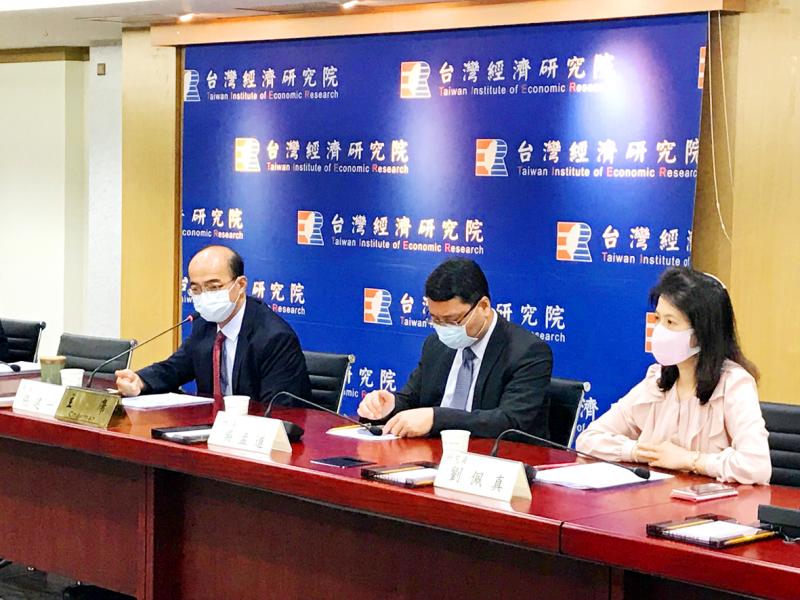The Taiwan Institute of Economic Research (TIER, 台灣經濟研究院) yesterday raised its forecast for the nation’s GDP growth from 1.83 to 1.91 percent and expects the momentum to more than double next year as the adverse effects of the COVID-19 pandemic begin to fade.
Taiwan’s economy might expand 4.1 percent next year, bolstered by strong demand for advanced semiconductors, realignment of technology supply chains and renewable energy investment, the Taipei-based think tank said.
Yesterday’s report was the first time that TIER has issued a forecast for the economy for next year.

Photo: Li Ya-wen, Taipei Times
GDP is expected to grow 3.72 percent in the first quarter, 6.68 percent in the second, 3.23 percent in the third and 2.63 percent in the fourth quarter, the think tank said in a report.
Demand for 5G wireless communications devices is expected to swell next year as the world emerges from the pandemic, aided by the creation of vaccines, TIER president Chang Chien-yi (張建一) told a news conference.
International research institutions share the view that the global economy would improve next year, which bodes well for Taiwan’s exports, he said.
Taiwan’s semiconductor manufacturers would benefit from the trend, he said.
Reshoring by technology firms moving high-end production lines to Taiwan from China would also boost outbound shipments, with the effect already evident for exports of information and communications technology products, government data showed.
Exports are expected to grow from a revised 1.85 percent this year to 4.87 percent next year, TIER’s report said.
Private investment, a main growth driver last year and in the first half of this year, might climb 4.64 percent next year, compared with 2.14 percent this year, it said.
Local semiconductor firms would continue to upgrade to meet customer demand for the newest technologies, and the government’s promotion of renewable energy sources would attract more foreign investment, TIER said.
Private consumption could rebound from a 1.61 decline this year to a 3.18 percent increase next year, as people would feel more comfortable spending money even though virus infections are spiking again in many parts of the world, TIER economist Gordon Sun (孫明德) said.
COVID-19 mortality rates have noticeably subsided as people adapt to disease-prevention measures, Sun said.
However, Sun said that he expects travel restrictions to stay in place in Taiwan and around the world next year, paving the way for revenge spending after nations lift their disease-prevention controls.
Sinopac Financial Holdings Co (永豐金控) chief economist Jack Huang (黃蔭基) told the news conference that he is expects the TAIEX to rally to the 14,000-point mark next year, thanks to the nation’s healthy economy and profit-making tech names.
“Next year will be a prosperous year,” the best year for the nation’s economy in five years and favorable for private consumption, Huang said.
However, he said that US-China tensions could still send ripples through the global economy.
The Directorate General of Budget, Accounting and Statistics in August predicted Taiwan’s GDP would grow 3.92 percent next year. It is due to update its forecast on Nov. 27.
Additional reporting by CNA

OPTIMISTIC: The DGBAS sharply upgraded its GDP growth estimate from 3.54 percent to 7.71 percent after the Taiwan-US trade agreement signing and given AI optimism The US imported more from Taiwan than China for the first time in decades, as US President Donald Trump’s tariffs reshape trade flows while a global boom in artificial intelligence (AI) fuels demand for tech products. US purchases of goods from China plunged almost 44 percent in December last year from 2024 to US$21.1 billion, US Department of Commerce data showed on Thursday. By contrast, shipments from Taiwan more than doubled during the same period to US$24.7 billion. The soaring Taiwanese shipments to the US reflect the huge expansion in supplies of chips and servers for AI companies, which has completely changed

NON-NEGOTIABLE: The US president’s action ran counter to one of the US’ ‘six assurances’ on not consulting China about arms sales to Taiwan, US lawmakers said US President Donald Trump’s admission that he is discussing arms sales to Taiwan with Chinese President Xi Jinping (習近平) is “alarming and a blatant violation of US policy and the six assurances,” US Representative Ro Khanna said on Tuesday. Trump on Monday said he would decide soon on whether to send more weapons to Taiwan, after Xi warned him not to do so. “I’m talking to him about it. We had a good conversation, and we’ll make a determination pretty soon,” Trump told reporters aboard Air Force One when asked about warnings raised by Beijing during a phone call with Xi over

The Central Election Commission has amended election and recall regulations to require elected office candidates to provide proof that they have no Chinese citizenship, a Cabinet report said. The commission on Oct. 29 last year revised the Measures for the Permission of Family-based Residence, Long-term Residence and Settlement of People from the Mainland Area in the Taiwan Area (大陸地區人民在台灣地區依親居留長期居留或定居許可辦法), the Executive Yuan said in a report it submitted to the legislature for review. The revision requires Chinese citizens applying for permanent residency to submit notarial documents showing that they have lost their Chinese household record and have renounced — or have never

US and Chinese fighter jets briefly faced off above waters near the Korean Peninsula this week, Yonhap News agency reported, marking a rare confrontation in that area between the two superpowers. About 10 US fighter jets on Wednesday departed an airbase in Pyeongtaek, South Korea, for drills above international waters off South Korea’s western coast, the news outlet cited unidentified military sources as saying. While the US planes did not enter China’s air defense identification zone, Beijing scrambled planes as they neared that region, the report said. “The Chinese People’s Liberation Army organized naval and air forces to monitor and effectively respond